
The United States is cautiously exploring the possibility of reopening a consulate in Taliban-controlled Afghanistan, according to a newly released strategy document from the State Department.
The move signals a potential shift in U.S. policy toward limited engagement with the isolated Islamist regime, while aiming to achieve multiple security, political and economic objectives.
“With the Taliban, we advocate for consular access, transparency and accountability for Americans; we also support the work of the Special Presidential Envoy for Hostage Affairs to obtain the release of Americans unjustly detained,” reads the recently approved Integrated Country Strategy Afghanistan, which was approved in October 2023.
With the fall of the Afghan government in August 2021, the U.S. shut down its embassy in Kabul, marking a symbolic end to two decades of military and political engagement with Afghanistan.
Since then, U.S.-Taliban interactions have been limited to sporadic meetings outside of Afghanistan, mainly in Doha, Qatar, where the U.S. has stationed a charge d’affaires to Afghanistan.
“Even as — and for as long as — the United States does not recognize the Taliban as the legitimate government of Afghanistan, we must build functional relationships that advance our objectives and further our understanding of the Taliban’s readiness and ability to fulfill their commitments to us,” the strategy paper states.
The new U.S. strategy outlines four strategic mission areas, namely counterterrorism, economic assistance, local engagement, and consular services for U.S. citizens inside Afghanistan and assisting Afghans who want to migrate to the United States.
The strategy maintains that Washington will “continue to speak out for basic rights of the Afghan people, especially women and girls.”
U.S. officials have repeatedly said that any normalization with the Taliban, including ending decades-long sanctions on their leaders, depends on the reversal of Taliban’s repressive policies and the formation of an inclusive Afghan government.
Security, political risks
While not recognizing the Taliban’s interim government, some countries, including U.S. allies like India, Japan and Turkey, have maintained diplomatic missions in Kabul.
The United Nations, including its political mission, has also remained operational in the country.
Last year, an independent assessment sponsored by the United Nations called for increased and direct engagement by the international community with de facto Taliban authorities.
“From a logistical standpoint, it would be easier for the U.S. to help Afghans seeking paths to the U.S. if it had consular staff and facilities open on the ground,” Michael Kugelman, South Asia Institute director at the Wilson Center, told VOA.
However, Kugelman cautioned about the political and security risks of a return to Afghanistan, especially during a U.S. election year.
“The Biden administration would likely feel the security risks are prohibitive,” he said.
Terrorism-related violence in Afghanistan has plummeted by 75% over the past two years, according to a 2023 Global Terrorism Index from the Institute for Economics & Peace.
The drop appears to have resulted from an end of the Taliban’s war against the former U.S.-backed Afghan government.
Despite the Taliban’s claim of restoring peace, terrorist groups like the Islamic State’s Khorasan branch have perpetrated attacks in Afghanistan killing hundreds of people mostly religious minorities.
“Security does not appear to be the issue, but how to decide the relationship with the Taliban is,” Kathy Gannon, former Associated Press bureau chief in Afghanistan and Pakistan, told VOA.
Gannon argued that the United States, like other countries, needs to engage with 40 million Afghans inside the country in order to charter an effective policy.
